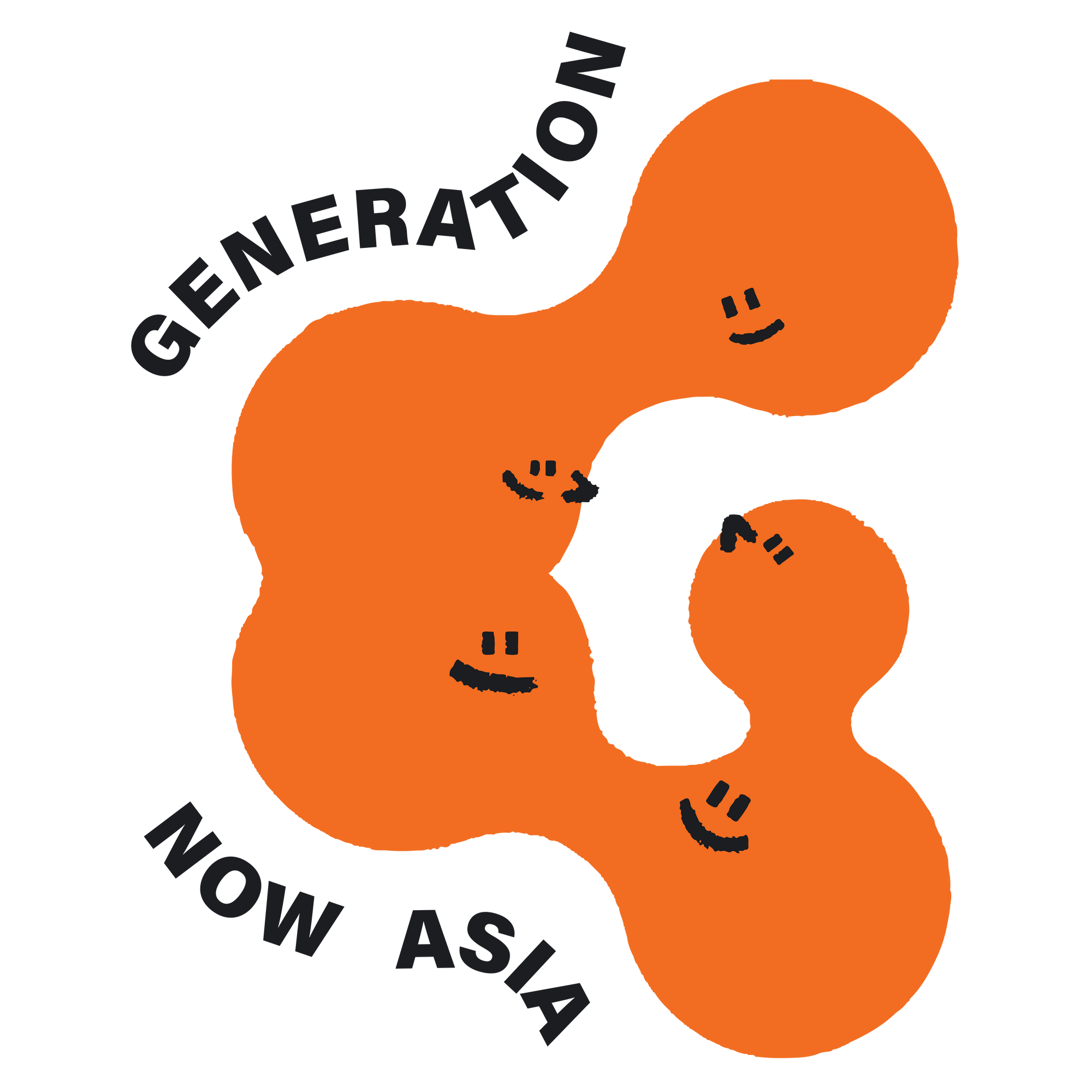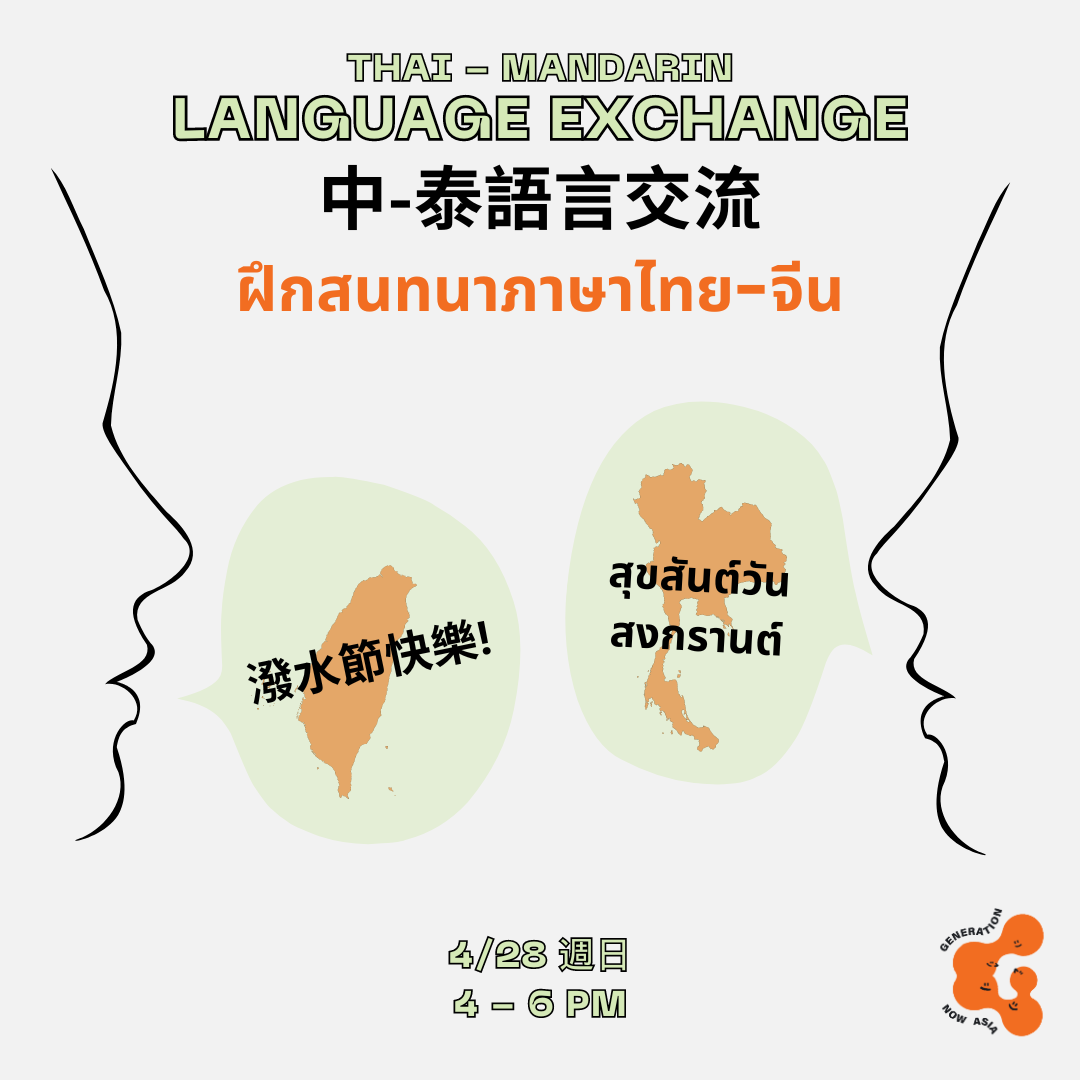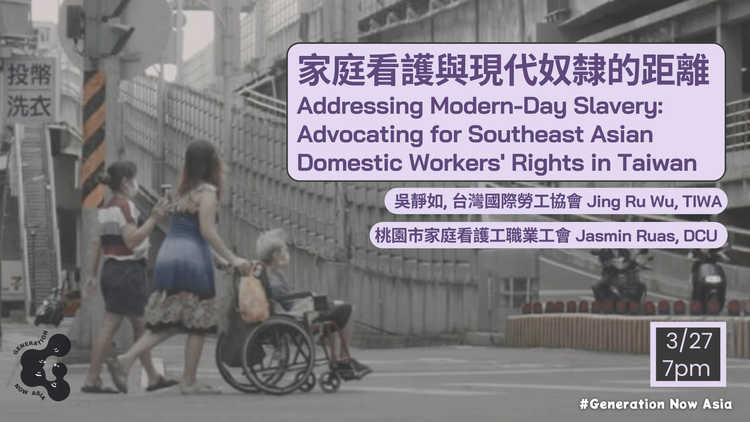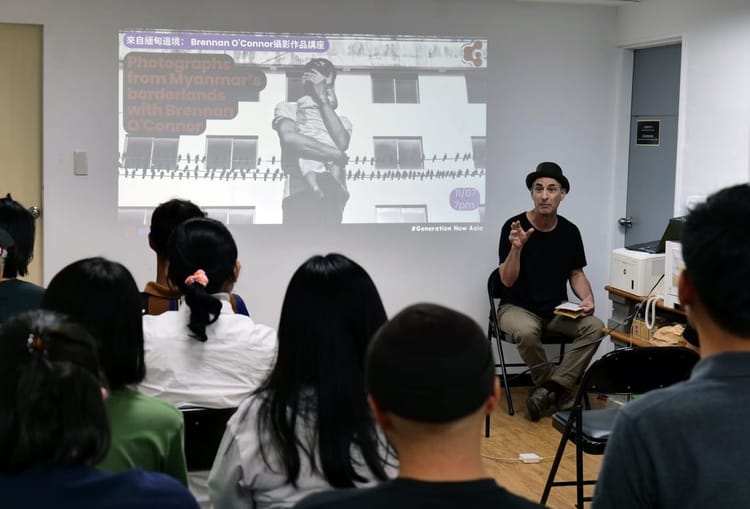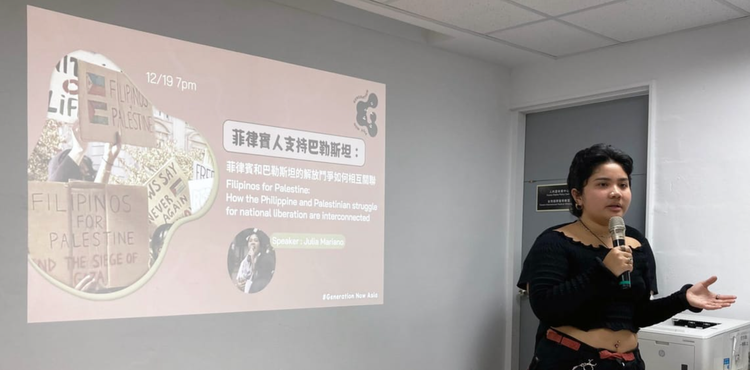【緬甸移工在泰國:日益脆弱且高升的受剝削風險】 Burmese Migrant Workers in Thailand: Growing Vulnerability and Risks of Exploitation
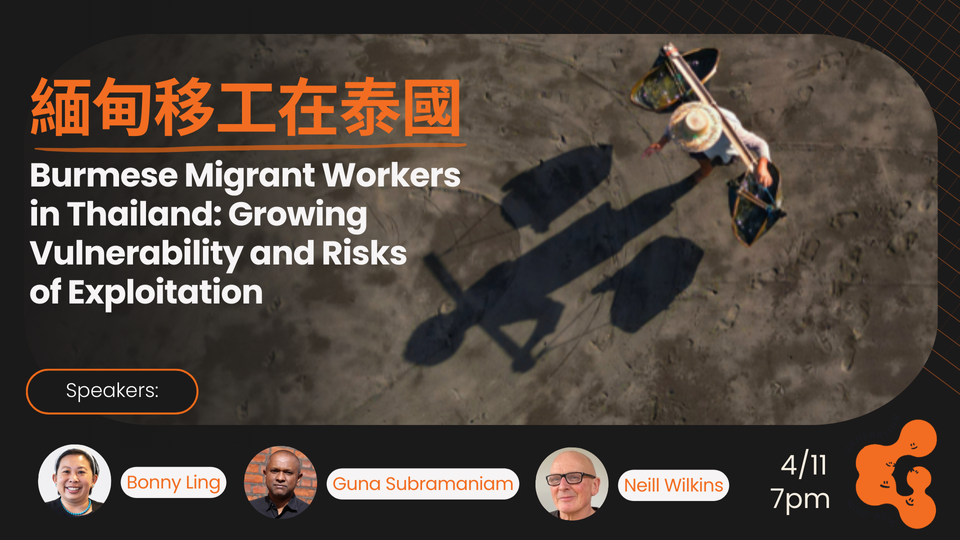
Due to decades of political and economic turmoil, Burmese individuals have long sought better employment opportunities in neighbouring Thailand. Here, they make up more than half of the migrant workforce, primarily employed in agriculture, fisheries and construction.
There are over 2 million documented Burmese migrant workers living in Thailand, in addition to a considerable number also working under the radar. These workers play a crucial role in bolstering Thailand's economy, however they often experience various forms of exploitation, ranging from manipulation by brokers to exorbitant debts, wage theft to harsh living and working conditions.
Those who migrate to Thailand from Myanmar to work without proper documentation often encounter severe challenges. Stripped of access to essential public services and legal protection, they are highly susceptible to exploitation and abuse. Moreover, their children, born into undocumented status, lack birth certificates, thrusting them into a precarious stateless existence with limited prospects for education, healthcare, and employment. This vulnerability exposes them to the grave risks of human trafficking and other human rights violations.
Join us for an event with research experts to reflect on the challenges faced by Burmese migrant workers in Thailand, and consider the hidden costs in supply chains. Through an interactive workshop during this event participants will have the opportunity to explore the urgent need to create robust protection mechanisms to support Southeast Asian migrant workers in the region and discuss how as individuals we can contribute to ethical consumer practices. Your participation in this dialogue is invaluable as we strive to foster awareness and advocate for meaningful change for Southeast Asian migrant workers in the region.
Topics to be covered in GNA’s include:
- Myanmar context driving outward migration, including conscription
- Current formal and informal migration routes and their costs
- Working conditions and challenges faced by Myanmar migrant workers in Thailand
- Current situation concerning identity documents and passports, work permits, remittances, taxation
- Problems and structural discrimination that undocumented burmese migrant workers and the challenges their stateless children face in Thailand
- Recognising the hidden costs in supply chains and considering how we can be ethical consumers to actively contribute to combatting the exploitation of migrant workers and promoting ethical practices
Speakers:
Bonny Ling: Executive Director at Work Better Innovations; Research Fellow at IHRB
Dr Bonny Ling is the Executive Director of Work Better Innovations, an international social enterprise working on new ideas for a responsible economy, both as a research consultancy and as a community service organisation. Bonny is also a Senior Non-Resident Fellow with the University of Nottingham Taiwan Research Hub; a Research Fellow at the international think-tank, Institute for Human Rights and Business; a Global Taiwan Institute Scholar and Visiting Professor at the School of Law, National Yang Ming Chiao Tung University, where she teaches a postgraduate course on business and human rights. She is a Co-Founder of the Taiwan Project for Business and Human Rights, a project dedicated to increase knowledge and build the local capacity needed to address business and human rights issues in Taiwan.
Guna Subramaniam: Asia Regional Manager, Migrant Workers Programme, Institute for Human Rights and Business
Guna has over 20 years varied experience in the nonprofit sector across the Asia Pacific and Central Africa. This includes building partnerships with multiple stakeholders in business and human rights, resettlement programs for refugees, and managing investigations on wildlife trafficking. At IHRB, Guna manages the Migrant Workers programme and provides support for the Just Transitions and Oceans programmes in the Asia region. He coordinates with businesses, governments and civil society organisations for their engagement with the Leadership Group for Responsible Recruitment (a coalition of global brands, CSOs and UN agencies), and their participation at regional roundtables and the Global Forum for Responsible Recruitment.
Neill Wilkins: Head of Migrant Workers Programme at Institute for Human Rights and Business
Neill Wilkins is responsible for all aspects of the IHRB Migrant Workers programme and in 2011 helped oversee the development of the Dhaka Principles for Migration With Dignity - a set of human rights based principles that offer a clear framework for understanding the recruitment and employment of migrant workers worldwide. More recently Neill has led much of IHRB’s work around responsible recruitment and the promotion of recruitment models based on the Employer Pays Principle which prohibit the charging of recruitment fees and costs to workers. Neill also manages IHRB engagement with the modern slavery agenda and speaks regularly at events focussed on forced labour, trafficking and transparency legislation.
🔸 Language: English (Mandarin translation assistance can be provided on request)
🔸 Date: 11th April 2024 (Thursday)
🔸 Time: 19.00 - 20.30pm
🔸 Venue: Taipei - The address will be sent via email confirmation.
🔸 RSVP: https://forms.gle/QiYajyhddszAxY5J6
Kindly confirm your attendance by filling in the google form.
緬甸移工在泰國:日益升高的脆弱性與受剝削風險
由於數十年的政治和經濟動蕩,緬甸人長期以來一直在鄰國泰國尋求更好的就業機會。他們佔了泰國移工人口超過一半的比例,主要從事農業、漁業和建築等工作。
在泰國有超過200萬名有證件的緬甸移工,但除了這些有證件的合法移工外,還有許多黑數存在。這些工人對泰國經濟的發展有著至關重要的作用,但他們通常會遭受各種形式的剝削,例如受到仲介的操縱、高額債務、扣工資,以及惡劣的生活和工作條件等。
從緬甸移民來泰國工作,如果沒有適當的文件,通常會遇到嚴重的挑戰。在無法獲得基本公共服務以及被剝奪法律保障的情況下,他們極易受到剝削和虐待。此外,他們的子女無法獲得出生證明文件,被迫處於不穩定的無國籍狀態,因而無法得到教育、醫療,與就業的保障。這種脆弱性使他們面臨著嚴重的人口販運和人權侵害的風險。
邀請您一同參與這場活動,跟研究專家一起思考緬甸移工在泰國面臨的挑戰,並識別出供應鏈中的隱藏成本。本次活動以互動式工作坊的形式探討協助東南亞移工建立穩固保護機制的迫切性;並且討論我們作為個人可以如何實踐道德消費。
此次互動性工作坊將討論以下主題:
- 緬甸人口外移與徵兵的脈絡
- 目前正式和非正式的移民途徑及成本
- 緬甸移工在泰國面臨的勞動條件和挑戰
- 身份證件和護照、工作許可證、匯款和稅收的現況
- 無證的緬甸移工在泰國面臨的問題與結構性歧視,以及其無國籍子女所面對的挑戰
- 供應鏈中的隱藏成本、如何透過成為道德消費的實踐者,積極去除對移工的剝削,並支持道德和透明的供應鏈
講者:
Bonny Ling:Work Better Innovations 執行董事; Institute for Human Rights and Business(IHRB)研究員
Bonny Ling 博士是 Work Better Innovations 的執行董事,這是一家國際社會企業,致力於為責任經濟提出新的理念,同時也作為研究諮詢機構,以及社區服務組織。Bonny 也是英國諾丁漢大學台灣研究中心的高級研究員、國際智庫人權與商業研究所的研究員;此外,Bonny也是全球台灣研究院的學者以及國立陽明交通大學法學院的訪問教授,教授關於商業和人權的研究所課程。她是台灣企業人權方案(Taiwan Project for Business and Human Rights)的共同創辦人,該計劃致力於增加知識並建立解決台灣企業與人權問題所需的地方量能。
Guna Subramaniam:人權與商業研究所移工計劃亞洲區域經理
Guna 在亞太地區和中非地區的非營利部門擁有超過 20 年豐富的經驗。這包括與企業與人權利害關係人建立夥伴關係、為難民提供安置計劃,以及管理野生動物走私的調查。在人權與商業研究所,Guna 管理著移工計劃,並為亞洲地區的公平過渡和海洋計劃提供支持。他與企業、政府和公民社會組織協調,讓它們參與盡責招聘的領導小組(Leadership Group for Responsible Recruitment )(一個由全球品牌、民間社會組織和聯合國機構組成的聯盟),並參加區域的圓桌會議和全球盡責招聘論壇(Global Forum for Responsible Recruitment)。
Neill Wilkins:人權與商業組織的移工計畫( Migrant Workers Programme at Institute for Human Rights and Business)負責人
Neill Wilkins 主理 IHRB 移工計劃(Migrant Worker Programme),並在 2011 年協助監督了達卡負責任的移工招聘與僱用原則(Dhaka Principles for Migration With Dignity)的制定, 這是一套以人權為基準的原則,為全球理解移工招聘和就業提供了清晰的框架。最近,Neill 主導了在人權與商業組織招聘方面的大部分工作,並推行零付費政策,禁止向工人收取招聘費用和成本。Neill 還負責 IHRB 在現代奴隸問題上的參與,並定期在關注強迫勞動、販運和透明立法的活動上發言。
🔸 活動語言: 英文 (若有中文翻譯協助需求,歡迎於報名表中通知我們)
🔸 活動日期: 2024年4月11日 (四)
🔸 活動時間:19:00 - 20:30
🔸 活動地點: 台北,活動地址會另外以郵件發送。
🔸 活動報名表: https://forms.gle/QiYajyhddszAxY5J6
